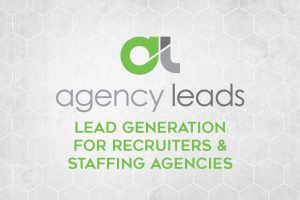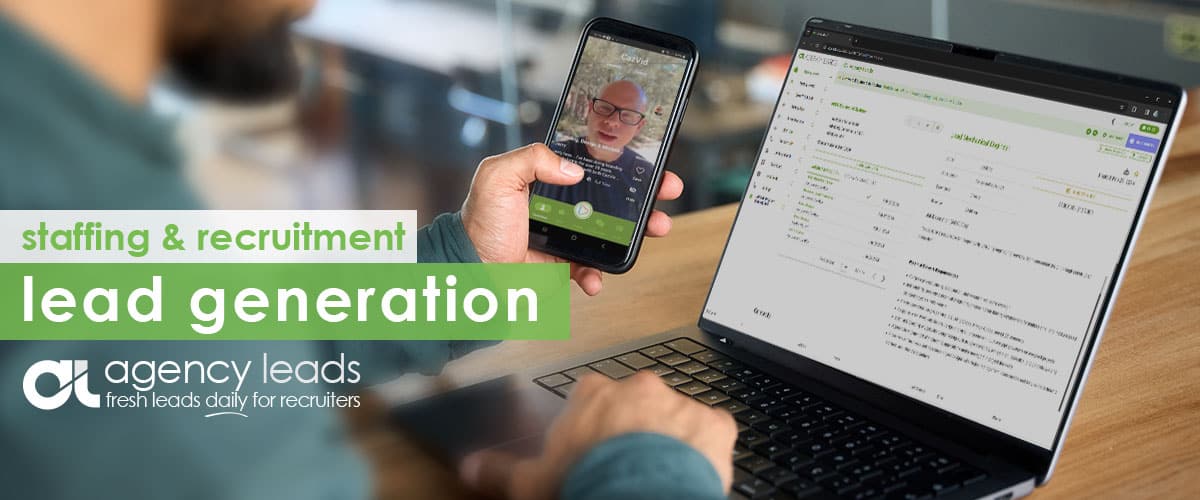Benefits of Lead Segmentation
How to separate different lead types for recruitment agencies based on your goals

Employment agencies operate in an increasingly competitive market where the success of their business depends on their ability to draw in and keep clients. Knowing the different lead types available to employment agencies and having a lead generation plan that enables them to acquire, cultivate, and turn prospective client contacts into actual business prospects are crucial for achieving this.
This article will define leads for employment agencies, describe the many kinds of leads, and describe the traits of each form of lead. In addition, we’ll explain lead segmentation, its advantages, and how to segment leads in accordance with your goals.
What are leads for employment agencies?
The contact information of potential clients who have expressed interest in the services provided by a recruitment or employment agency is referred to as leads. These connections may originate from a variety of places, including social media platforms, websites, blogs, events, recommendations, etc.
The first step in creating business prospects and increasing sales for employment agency is to generate leads. But not all leads are prepared to work with a staffing or recruiting firm. Some people might be merely seeking for information, while others might be weighing their alternatives, and still others might be set on hiring.
To provide leads with a service that meets their requirements and expectations, it is vital to classify and qualify them based on their level of interest and purchasing process maturity.
Types of leads for job agencies
There are other ways to categorize the different lead kinds for employment agencies, but the BANT model (Budget, Authority, Need, and Timing), which stands for Budget, Authority, Need, and Time, is one of the most popular. The following are the several lead types for employment agencies:
- Cold lead: A potential client who has expressed little to no interest in the solutions provided by a staffing or recruiting firm. You lack the following: a designated budget, the power to make decisions, a pressing need, and a hiring deadline. To develop trust and pique curiosity, this kind of lead needs significant education and nurturing work.
- Lead with tempered interest: This is a contact who has expressed tempered interest in the products and services provided by a staffing or recruitment firm. You have an anticipated budget, some decision-making power, a need that has been identified but is not urgent, and an idea of when you will need to hire someone. Here, the lead needs constant oversight and persuasion work to produce value and set itself out from the competition.
- Hot lead: A prospective customer who has expressed a strong interest in the products or services that an employment or recruiting firm provides. You have the power to make decisions, you are given a budget to work with, you have an immediate need, and the hiring window is set. To develop satisfaction and loyalty, this type of lead needs prompt, efficient closing and loyalty activities.
Features of the many lead kinds for employment agencies
The following are the key features that help distinguish the various lead types for employment agencies:
- Budget: This is the sum of money the contact is willing to spend on a hiring or employment agency’s services. The budget may be fixed, variable, or estimated and may be influenced by a number of elements. Elements include the size of the business, the industry, the number of openings, the qualifications of the applicants, etc.
- Authority: This is the level of sway a contact has when deciding whether to use the services of a recruiting or employment agency. According to hierarchy, role, experience, trust, and other factors, authority may be entire, partial, or nonexistent.
- Need: The contact has a problem or an opportunity that can be solved or seized by the assistance of a staffing or recruitment firm. The situation, objective, difficulty, incentive, etc. may determine whether the need is evident, hazy, or uncertain.
- Time: This is the window of opportunity for the contact to work with a staffing or recruitment firm. The length of the time depends on factors like urgency, priority, availability, planning, etc.
Lead segmentation: what is it?
To provide leads with a tailored and efficient service, lead segmentation is the process of splitting and classifying them based on their shared features. Additionally, it enables you to modify the message, channel, frequency, and content in accordance with the requirements and expectations of each lead group.
Lead segmentation is a crucial strategy for enhancing lead management and enhancing outcomes. By dividing up leads, you can:
- Boost the usefulness and worth of the provided service
- Boost dialogue and connections with leads
- Cut back on the price and duration of customer acquisition
- Boost sales and customer retention
- Maximize the campaigns’ return on investment (ROI)
Advantages of segmenting leads
For employment and recruiting agencies, lead segmentation has a number of advantages, including:
- Learning more about the leads’ requirements.
- Able to provide a better, more individualized service as a result.
- Promotes market uniqueness and build credibility.
- Boosts production and resource efficiency.
- Gauge performance and elevate service quality.
How to divide up different lead types for job agencies based on your goals?
The following actions must be taken to segment different lead types for employment agencies in accordance with your goals:
- Establish your goals: Identifying your goals for your lead generating plan should be your first step. For instance, growing the clientele, enhancing the caliber of prospects, slashing the sales cycle, etc.
- Decide on your criteria: The next step is to decide on the criteria you’ll use to divide up your leads into different groups. Budget, authority, need, timing, industry, size, location, etc. are a few examples.
- Gather your data: The next action you should take is to gather the information required to put your criteria into practice. Through social networks, telephone surveys, web forms, etc., as examples.
- Review your data: The fourth step is data analysis, which will help you categorize and qualify your leads. For instance, using resources like CRM (Customer Relationship Management), grading, and scoring.
- Develop your segments: You must create your segments in the fifth step using your data and criteria. For instance: cold lead with a small budget and no power; heated lead with a high budget and full authority; tempered lead with a medium budget and some authority; etc.
- Create your strategy: Creating your strategy for each part is the sixth action you should take. Choosing the right message, medium, frequency, and content for each sort of lead, for instance.
Employment agency lead types and how Agency Leads can benefit you

A program called Agency Leads provides leads to recruiters and job agencies. The service gives you the names and contact information of potential customers who have expressed interest in the services your employment agency offers, which helps you generate more and better leads for your business.
You have access to an updated and verified database of contacts from businesses looking for applicants for their open positions through Agency Leads. Additionally, it facilitates tracking and managing your leads with features like CRM, scoring, grading, etc.
To provide your leads with a tailored and efficient service, categorize your leads using Agency Leads in accordance with your criteria and objectives. As a result, you’ll be able to shorten the sales cycle, boost the conversion and loyalty of your clients, and maximize the return on investment of your marketing activities.
Interested in learning more? Get a demo of Agency Leads on their website. Discover how it might help you grow your employment agency’s clientele.
Conclusion
By categorizing and selecting prospective client connections based on their level of interest and purchasing process maturity, employment agencies may provide a more individualized and effective service. They benefit from enhancing communication and connections with leads, optimizing resources, and increasing productivity, conversions and customer loyalty. Ultimately recruitment agencies benefit from understanding the many types of leads that are available and how to segment them in accordance with their objectives which increase their campaigns’ return on investment. With Agency Leads, you can gain access to quality leads that meet your individualized objectives.

